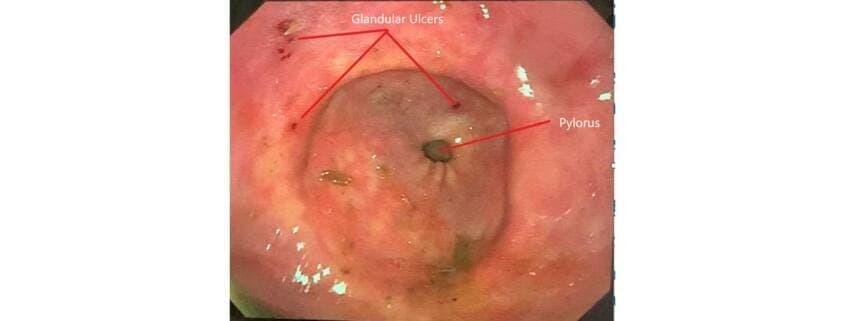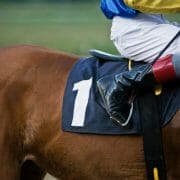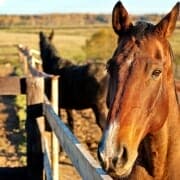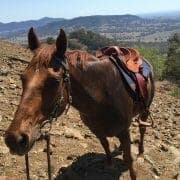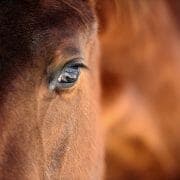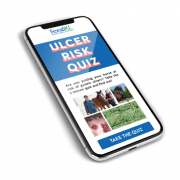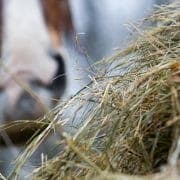Is There an Effect of Diet on Glandular Ulcers?
Review of Effect of diet composition on glandular gastric disease in horses
My ears pricked when I received an email alert about a study that had just been published “Effect of diet composition on glandular gastric disease in horses”. That’s because up until recently, we’d thought that glandular disease risk factors were management and stress related, and diet didn’t really play a role. Of course, I needed to know more, with mounting evidence that diet may indeed play a role in glandular ulcers in some horses.
This particular study looked at the effect on glandular scores of substituting half of the grain concentrates in the diet with alfalfa pellets. Those which remained on the full rate of grain concentrate in their diets were called the Control group and those receiving half grain concentrate and half alfalfa were called the Alfalfa group. Trainers were instructed to feed their horses the same diet for 4 weeks prior to the study commencing (Day 0) – the before diet was the same as the Control diet.
Summary of findings
- When comparing the Control and Alfalfa diet groups, no difference in the number of horses with glandular ulcers were found between the two groups.
- Within the Control group, the number of horses with a glandular score ≥2 increased over the study period.
- In the Control group, horses that had a glandular scores 2-4 at the beginning, did not show any improvement over the study period.
- In the Alfalfa group, 5 out of 6 horses that had glandular scores 2-4 at the beginning of the study, showed improvement in their glandular scores (improved from ≥2 to 0-1).
This is where things took an unexpected and interesting turn. The researchers compared the non-ulcerated horse group (glandular scores 0-1) with ulcerated horse group (glandular scores ≥2) at Day 0. They found that simple sugar intake of the diet these horses were on before Day 0 was significantly different between these two groups. I know what you’re thinking…high sugars blah blah blah…but no! When comparing many variables including diet, the non-ulcerated group had a significantly higher daily intake of simple sugars in their before Day 0 diets, compared with the ulcerated group.
The researchers thought that higher daily intake of simple sugars which supports certain strains of Lactobacillus may have a protective effect in the stomach. Lactobacilli adhere to the gastric mucosa, forming biofilms and outcompeting pathogenic bacteria. This has been explored in rat models and supports the theory proposed by the authors.
Looking at the effect of substituting half the concentrate grain ration with alfalfa pellets, a positive effect was seen, with fewer horses with GGD at Day 42. The authors propose that this may be the results of a reduced amount of starch available to starch-utilising bacteria in the stomach. These starch-utilising bacteria produce fermentation products which change the pH of the stomach content, which cause other short chain fatty acids such as butyric acid to be more harmful, resulting in mucosal damage. The authors also add that alfalfa pellets offer a buffering effect within the stomach and can contribute to maintaining a higher pH despite acid secretions of strong fermentations associated with grain meals.
Key takeaways of the diet’s affect on glandular ulcers
-
- Some Lactobacillus strains may have a protective effect in the stomach, reducing glandular disease and accelerating healing of existing glandular lesions.
- Reducing starch in diets is beneficial to reducing the fermentation products in the gastric contents, which otherwise when combined with very acidic environment cause damage to the glandular mucosa.
- Inclusion of alfalfa (lucerne) pellets with grain concentrate can provide a buffering effect within the stomach to maintain a higher pH, reducing harmful effects of short chain fatty acids on gastric mucosa.
Many interesting findings! If you’d like to know the nitty gritty details or read the full article, it is available open access at: https://onlinelibrary.wiley.com/doi/epdf/10.1111/jvim.16747
Do you have a question or comment? Do you need help with feeding?
We would love to welcome you to our FeedXL Horse Nutrition Facebook Group. Ask questions and have them answered by PhD and Masters qualified equine nutritionists and spend time with like-minded horse owners. It’s free!
Click here to join the FeedXL Horse Nutrition Facebook Group

